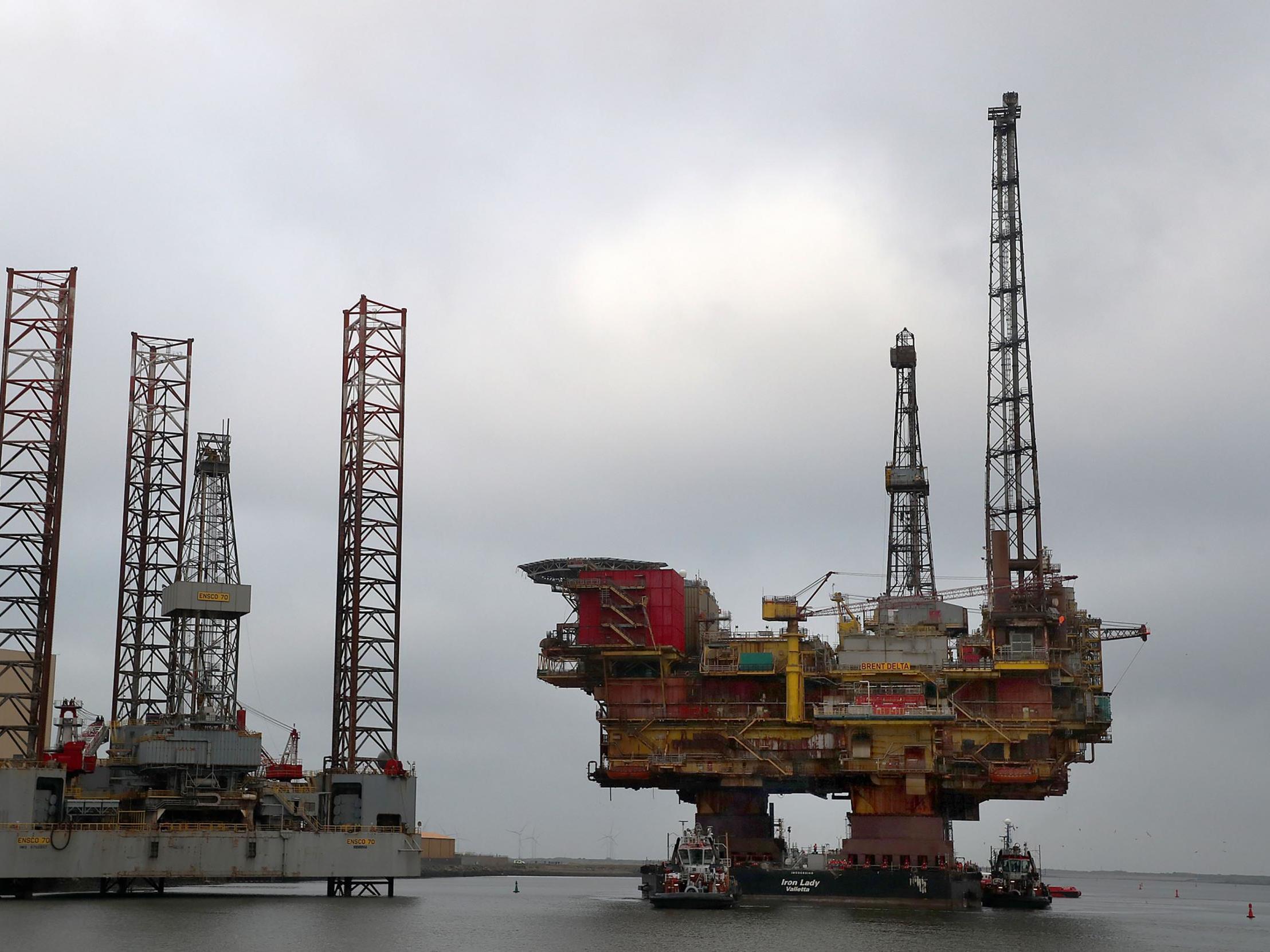North Sea oil rigs set to be abandoned while still full of crude oil and chemicals
Shell requires UK government permission to leave sub-aquatic structures in place

Your support helps us to tell the story
From reproductive rights to climate change to Big Tech, The Independent is on the ground when the story is developing. Whether it's investigating the financials of Elon Musk's pro-Trump PAC or producing our latest documentary, 'The A Word', which shines a light on the American women fighting for reproductive rights, we know how important it is to parse out the facts from the messaging.
At such a critical moment in US history, we need reporters on the ground. Your donation allows us to keep sending journalists to speak to both sides of the story.
The Independent is trusted by Americans across the entire political spectrum. And unlike many other quality news outlets, we choose not to lock Americans out of our reporting and analysis with paywalls. We believe quality journalism should be available to everyone, paid for by those who can afford it.
Your support makes all the difference.Thousands of tonnes of hazardous waste including crude oil could be abandoned in decaying North Sea rigs by Shell with the permission of the UK government, prompting growing concerns among other European countries.
Due to the cost and difficulty of dismantling the structures, the oil giant has proposed leaving the vast concrete legs from three oil rigs standing in the waters.
These could remain for up to 500 years after the platforms have been decommissioned.
There is an estimated 11,000 tonnes of oil and toxins mixed with sediment held within the Bravo, Charlie and Delta, structures, which were built in the Brent oil field, to the East Shetland Basin, in the 1970s.
Hundreds of other enormous rigs, which can be as tall as the Eiffel Tower and weigh as much as the Empire State Building, are due to be decommissioned over the next three decades.
Now there are fears UK government support for Shell’s plans to abandon the structures on the sea bed could set a precedent for how the oil platforms are dealt with in future.
Germany has issued a formal complaint over the plans and has won the support of Sweden, Belgium, Luxembourg and the Netherlands.
The UK government’s position was “grotesque”, German officials said.
Jochen Flasbarth, a state secretary at the German environment ministry told The Guardian he was “genuinely taken aback" by the ruling, adding: "We usually collaborate very closely with the United Kingdom on environmental issues."
Dr Doug Parr, chief scientist for Greenpeace UK, told The Independent: “It is hardly surprising that the UK government’s cheapskate approach to cleaning up the detritus from north sea oil exploration has become so unpopular with the EU and other states around the North Sea. The UK government says it is a champion of protecting our oceans – it should demonstrate that, not grant grubby favours and shortcuts to prop up a dying oil and gas industry.”
Earlier this year, the environmental group reported they had seen a copy of an official letter sent by German environment minister Svenja Schulze to former environment secretary Michael Gove on 21 January, 2019 after the UK had first endorsed Shell’s plans.
Ms Schulze wrote: “I am concerned to find there are no plans for disposal on land despite the fact that technical possibilities are available.”
The letter reportedly added the German environment ministry met with Shell on two occasions to raise their concerns, and also asked for the decision to be reviewed.
In October all 15 member states subject to the Ospar regulations will meet in London to decide the fate of the three structures. Ospar is the framework by which the countries together with the EU cooperate to protect the marine environment in the North-East Atlantic
In June this year, Shell removed the 25,000 tonne platforms from the three oil rigs, leaving the enormous leg, 20m wide, structures.
However, returning to remove the legs and the hazardous substances held within would be too expensive and too risky, they have argued.
A detailed review of Shell’s proposals, commissioned by the German government, has found the company’s methodology lacking.
“It appears that the proposals to leave cell contents in situ in Brent Bravo and Charlie currently look premature as they are not based upon accurate, valid information,” the document says. “Owing to self-imposed technical constraints Shell/Exxon have not been able to secure high quality information from their sampling efforts – this has resulted in the decommissioning programme submission containing a high number of assumptions and assertions.
“It is not clear that this approach meets OSPAR98/3 Decision intent of a properly executed scientific, evidence-based assessment.”
A spokesperson for Shell told The Independent the company was following the terms of the Ospar agreement.
They said: “Our recommendations are the result of 10 years of research, involving more than 300 scientific and technical studies. We established an independent group of scientific experts to review the findings and ensure all feasible decommissioning options were investigated thoroughly. We submitted our recommendations following extensive stakeholder engagement and only when we were confident that they were safe, technically achievable, and environmentally and socially sound.”
A Department for Business, Energy and Industrial Strategy spokesperson told The Independent: “Decommissioning is undertaken in accordance with UK and international obligations, in a safe and cost-effective manner while minimising risk to the environment.”
Join our commenting forum
Join thought-provoking conversations, follow other Independent readers and see their replies
Comments